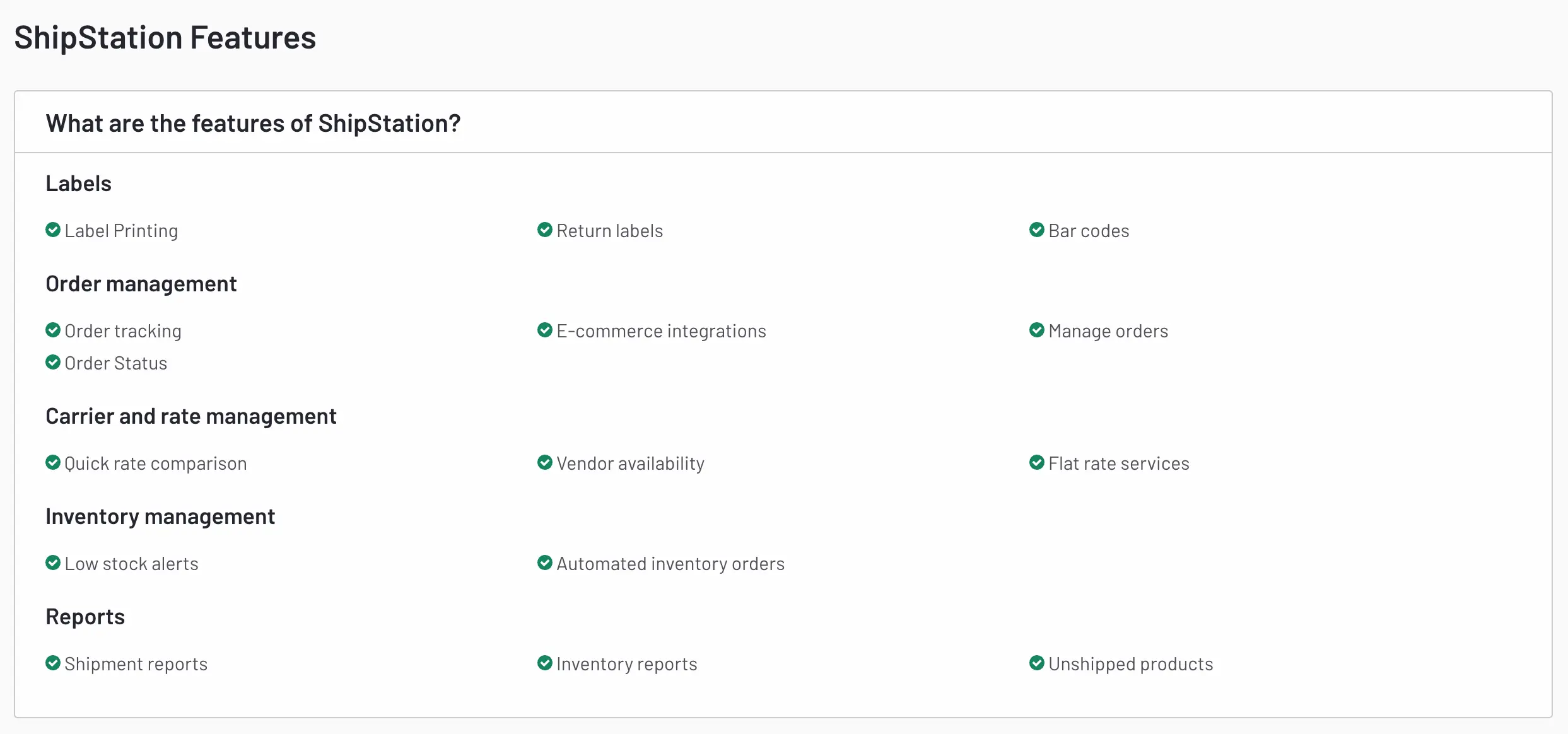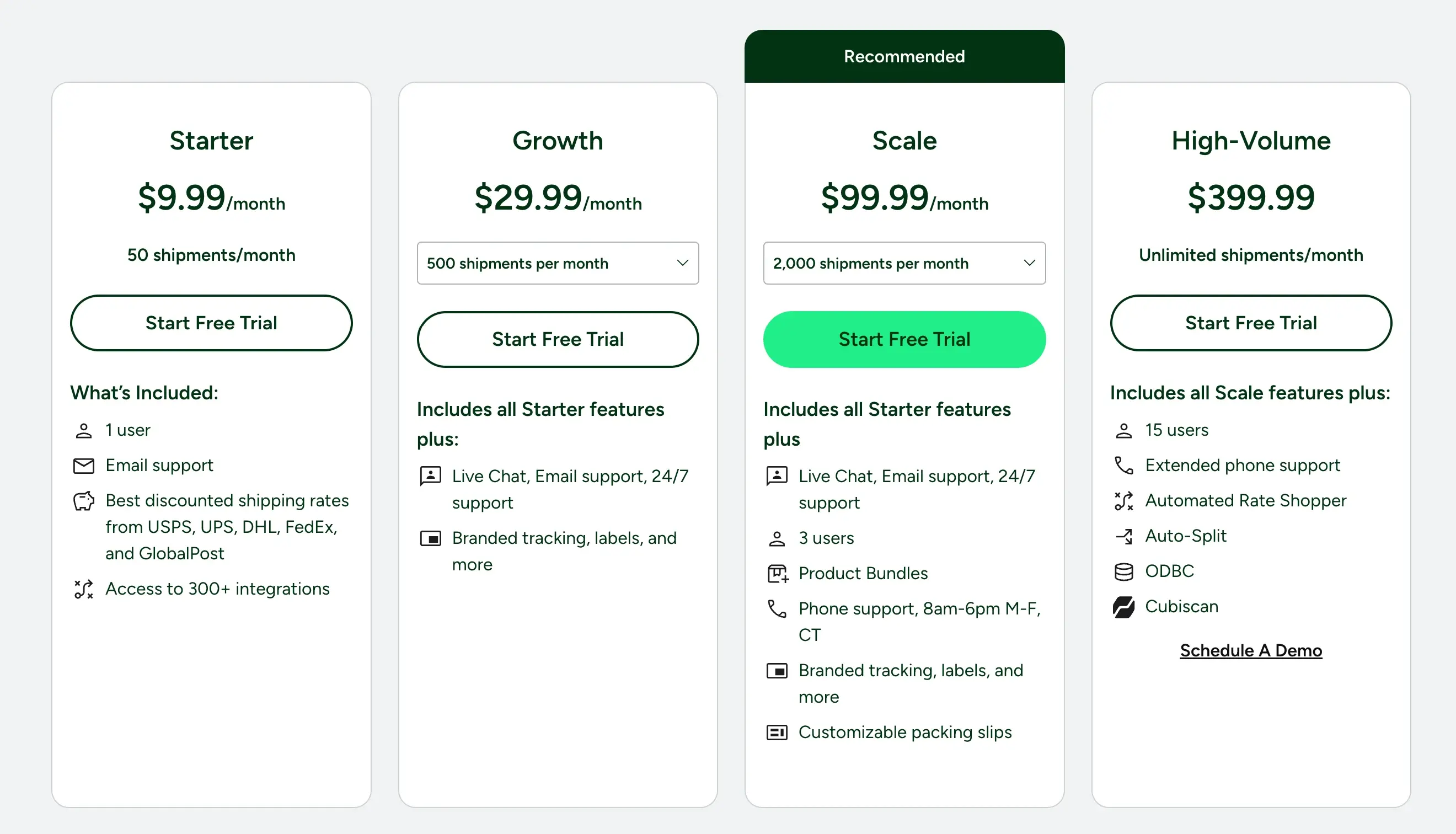Table of Contents
ShipStation Reviews: Details, Pricing, and Features
Overview
Order fulfillment is one of the most complex operations in an eCommerce business. It is the process of shipping, packing, and delivering products to customers. Being mostly labor-intensive, it is the one time the business gets to interact with customers firsthand. By ensuring a hassle-free order fulfillment process, you can maximize your customers’ entire shopping experience, and in turn, grow your business.
That’s the positive side of the equation. Like every coin, there is another side too - the picture where order fulfillment takes longer than expected or damaged goods are delivered to customers.
In such a scenario, regardless of how good your product is, customers are not likely to prefer your store for purchases and instead, they will move to another provider. And in the eCommerce world, customers who have gone once seldom come back.
Thankfully, there are software solutions in the market to make eCommerce fulfillment easier for businesses. ShipStation is a popular one of them and is used by thousands of eCommerce business owners who need to complete their order fulfillment hassle-freely.
To give you a complete picture of this solution, we are going to break it down and review different aspects of the business to see if it’s a good fit for your business. Let’s try to understand what exactly ShipStation is, how it works, and what is the reason behind great ShipStation reviews.
About ShipStation
Started in 2011, ShipStation company is the maker of ShipStation shipping software that aims to help eCommerce stores manage and import orders. Alongside order fulfillment, the company assists businesses with inventory and order management.
ShipStation has partnered with leading shipping countries across the globe such as FedEx, UPS, DHL, etc. This software is integrated with several other eCommerce platforms such as BigCommerce, WooCommerce, Shopify, and more.
Additionally, ShipStation has marketplace integrations with Walmart, Amazon, Etsy, eBay, etc., as well as several other integrations with mail carriers, sales channels, and marketing providers.
To get a better understanding of the ShipStation company, let’s take a look at how it works.
How does ShipStation work?
When an order is placed through a shipping channel, it can be added to ShipStation by selecting the “Update All Stores'' option on the homepage of your ShipStation account. Alternatively, you can choose to update orders only from a specific store.
Post receiving the order, to create a label for it, you need to provide the shipping details to the postage provider. These details typically include key information like the weight and dimensions of the order, delivery time, and insurance.
After the shipping options have been selected, ShipStation will provide you with the postage rates of your connected carrier providers so that you can find the lowest price for your shipment. With ShipStation Connect, you can print your shipping labels and tracking slips.
Once the shipping label has been created and printed, a notification will be sent out to the selling channel as well as the customer updating them on the shipment.
A tracking number will then be provided on the label, and you’ll be able to find the same on the grid of shipments as well. This will help in tracking the package via geo-tracking.
With the label in hand, it is up to you whether you want the selected shipping carrier to pick up the package from your location or you can drop off the package at the nearest branch of the shipping carrier.
Apart from the seamless order fulfillment process described above, ShipStation has quite a bit to offer which makes users want to give 5-star ShipStation reviews. Let’s take a look at some of the key features offered by it.
Key Features Offered by ShipStation

1. Custom Views
The custom views feature curates the user interface to your liking. With this option, you can pick what you like from different interface sizes for your default account page.
2. Automation
The automation feature offered by ShipStation allows users to customize the order fulfillment process to save time and money. The software authorizes selected actions to be automated for a set of orders.
3. Manage Multiple Carrier
ShipStation has partnered with multiple carriers to save you from the hassle of logistics. This is done with the aim to assist in order management, tracking packages, and printing labels.
All business shipping can be done directly from the app once you have connected with the account of your preferred carrier. ShipStation handles both domestic and international shipments. Some notable collaborations for shipping include FedEx, UPS, Royal Mail, DHL, and Hermes.
4. Order Management
With ShipStation, you can import data from 40 channels and more. Additionally, pre-configured shipping preferences based on customized packing slips, branded labels, and other specifications can be set for each order.
E-stores are automatically updated with tracking information and status, and the platform’s return management feature helps print return labels for every package with just one click.
5. Integrations
As mentioned above, ShipStation integrates with several marketplaces, eCommerce platforms, and shopping carts. The Custom Store Integration feature offered by the platform imports orders from other platforms that don’t integrate. Some partners of ShipStation include Shopify, Amazon, Quickbooks, eBay, and Etsy.
6. Reporting
The reporting tools provided by ShipStation include default reports, hotkey, exports, barcode scans, charts, and graphs. Additional reporting fields include shipping costs, inventory reports, sales trends, and postage history.
ShipStation Cost
The pricing of software is a deal-breaker for most businesses. ShipStation offers 6 different pricing packages under a monthly package that allows the user to connect with unlimited stores across multiple shipping channels, including packing slips and branded labels.
Along with a free 30-day trial, ShipStation company offers monthly packages of varying prices so that you can select based on your requirements and budget.

1. Starter
The starter plan is priced at $9 per month and allows 50 shipments across all eCommerce channels via 1 user. With this plan, you can avail branded packaging slips and labels. The community forum and email support can also be availed via this plan.
2. Growth
The bronze plan costs $29 per month with one user, and allows 500 shipments across all eCommerce platforms. Similar to the Starter Plan, this also provides branded labels and packaging slips along with community forums and email support.
3. Scale
At $99 per month, the Silver Plan allows for 1500 shipments across all eCommerce channels. This plan however provides 2 users along with branded labels and packing slips. Besides community forums and emails, support is also provided via live chat with the Silver Plan.
4. High Volume
The Gold Plan costs $399 per month and allows for 3000 shipments along with 3 users. Similar to the Silver Plan, this plan also comes with customized branded labels and packing slips, and support is provided via email, community forum support, and chat.
Now that we’ve covered the role, features, and pricing of ShipStation, let’s wrap up this ShipStation review with its advantages and disadvantages.
Pros of ShipStation
- Real-time reporting and custom views are offered so that ShipStation company’s performance can be monitored closely.
- Personalized tracking and returns pages are provided, which is a good tactic to build familiarity with customers.
- ShipStation is integrated with several big players in the eCommerce industry, and this can assist in expanding the functionality of your fulfillment.
- Data can be imported from over 40 channels, which makes it easier to track the operations of your business.
- You can showcase the performance of your business with customized graphs and reports.
- Flexible price ranges are offered by ShipStation so that you can pick a package that will fit both your budget and requirements.
- With ShipStation, you can sell your products anywhere across the globe and grow your business.
Cons of ShipStation
- Customer support is comparatively limited while setting up and running the software.
- There could be a slight learning curve for it takes some time to learn how to automate orders and manage inventory.
- Based on your mode of shipping, ShipStation can be quite pricey, for the shipping rates add up quickly.

Who is this app most suitable for?
ShipStation is a fitting shipping solution for small-medium sized eCommerce businesses. If you’re looking to grow your business, this app is certain to make your life much easier.
The software provides multiple solutions for order and shipping management and is ideal for streamlining the fulfillment cycle within clicks. The user interface is easy to use and can easily be integrated with several other eCommerce platforms.
In case you feel like ShipStation is not the right fit for your business or you are not convinced with a ShipStation review that you find online, you can opt for the below-listed ShipStation alternatives and competitors to the platform.
Why choose ClickPost over ShipStation?
ClickPost is a globally recognized shipping management platform designed to streamline logistics operations for eCommerce businesses. It stands out as one of the best Shipstation alternatives because it integrates automation, advanced analytics, and exceptional customer engagement features.
With ClickPost, businesses can manage carriers, monitor shipment statuses in real time, print shipping labels, and optimize order fulfillment through intelligent workflows. ClickPost also specializes in predictive delivery dates, reducing operational hiccups, and enhancing customer satisfaction.
ClickPost offers unmatched benefits for eCommerce businesses:
Benefits of ClickPost over ShipStation?
-
Custom Carrier Integrations: ClickPost integrates new carriers within a day at no additional cost, making it highly adaptable.
-
Predictive Analytics: Its predictive delivery date feature helps businesses set realistic customer expectations.
-
Customer-Centric Approach: The branded tracking page and proactive communication ensure a superior post-purchase experience.
-
Cost Efficiency: ClickPost's automation tools reduce manual intervention and operational costs.
In Conclusion
Now that you have a better understanding of what ShipStation is all about, it’s time to make the final call. This platform is one of the most popular shipping software in the eCommerce market and can be integrated with almost any platform.
ShipStation is guaranteed to provide you with a hassle-free order fulfillment solution, and that is clear from the amazing ShipStation reviews on several software platforms.